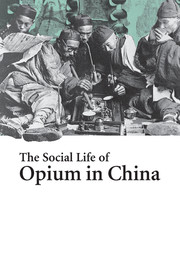Book contents
- Frontmatter
- Contents
- List of illustrations
- List of maps
- List of tables
- Acknowledgements
- Introduction
- 1 ‘The art of alchemists, sex and court ladies’
- 2 As the empire changed hands
- 3 ‘The age of calicoes and tea and opium’
- 4 ‘A hobby among the high and the low in officialdom’
- 5 Taste-making and trendsetting
- 6 The political redefinition of opium consumption
- 7 Outward and downward ‘liquidation’
- 8 ‘The volume of smoke and powder’
- 9 ‘The unofficial history of the poppy’
- 10 Opiate of the people
- 11 The road to St Louis
- 12 ‘Shanghai vice’
- Conclusion
- Notes
- Glossary
- Bibliography
- Index
Introduction
Published online by Cambridge University Press: 05 June 2012
- Frontmatter
- Contents
- List of illustrations
- List of maps
- List of tables
- Acknowledgements
- Introduction
- 1 ‘The art of alchemists, sex and court ladies’
- 2 As the empire changed hands
- 3 ‘The age of calicoes and tea and opium’
- 4 ‘A hobby among the high and the low in officialdom’
- 5 Taste-making and trendsetting
- 6 The political redefinition of opium consumption
- 7 Outward and downward ‘liquidation’
- 8 ‘The volume of smoke and powder’
- 9 ‘The unofficial history of the poppy’
- 10 Opiate of the people
- 11 The road to St Louis
- 12 ‘Shanghai vice’
- Conclusion
- Notes
- Glossary
- Bibliography
- Index
Summary
The history of opium is a major theme in modern Chinese history. Books and academic careers have been devoted to its study. Yet the question that scholars of the opium wars and of modern China have failed to ask is how the demand for opium was generated. Who smoked opium, when and why? Recreational smoking was foreign to China, as was opium itself. How and when, then, did opium come to lodge itself within the sophisticated Chinese culture of consumption? Opium not only thrived, it spread like wildfire over the next few hundred years. This was during a period when western Europeans, the British in particular, were naturalising tea and sugar.
Opium has its own story. Historians have not set opium in its social and cultural context; they have not taken its consumption into account in the historiographies of opium and modern China. Some have dwelt on the opium trade, some on the opium wars, some on imperialism and others on the politics of control. The political history of opium, like the theatre of war, is only part of the story. However, the vital questions for me are, first, the point at which opium was transformed from a medicine into a luxury item and, secondly, why it became so popular and widespread after people discovered its recreational value. A full understanding of the root problem of the opium wars and of the role of the wars in the emergence of modern China is not possible without first explaining who smoked opium, when and why.
- Type
- Chapter
- Information
- The Social Life of Opium in China , pp. 1 - 9Publisher: Cambridge University PressPrint publication year: 2005



